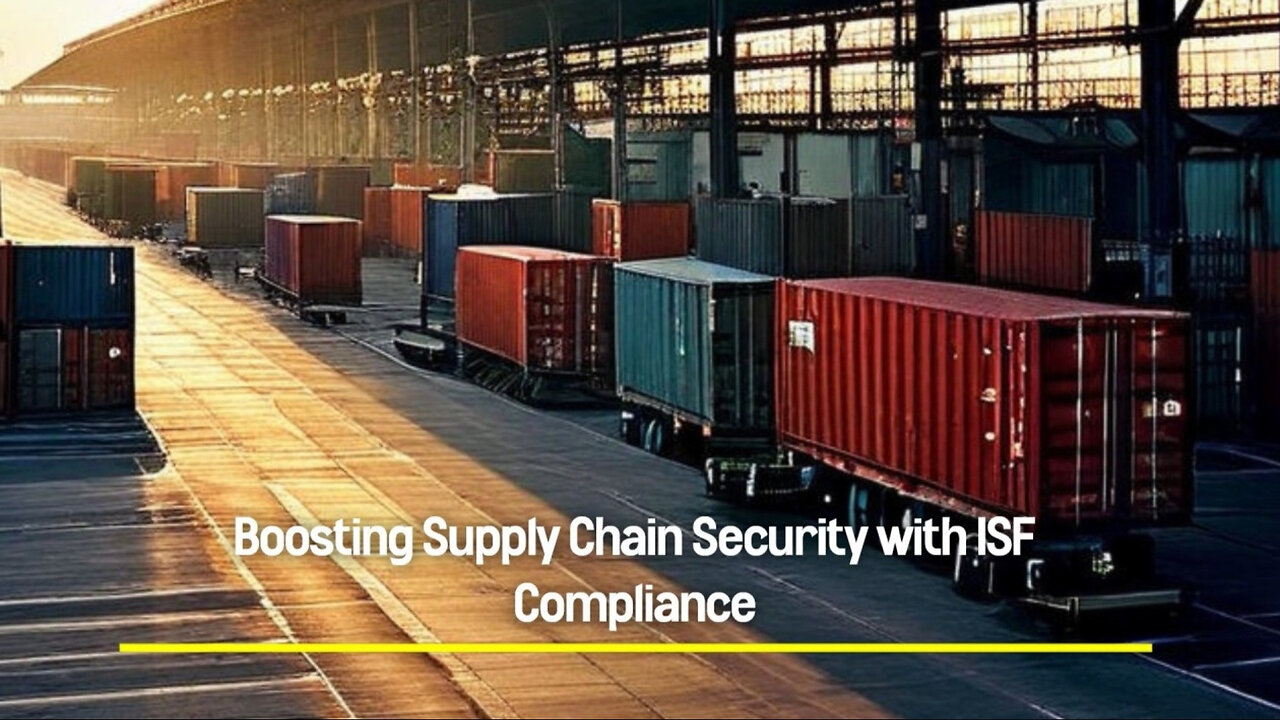Premium Only Content

Demystifying Importer Security Filing: Ensuring Supply Chain Security
License To Import // 323-578-6432 // file@licensetoimport.com // www.licensetoimport.com
Customs brokerage plays a crucial role in facilitating the smooth and secure movement of goods across borders in international trade. This specialized service, provided by licensed professionals, acts as an intermediary between importers and customs authorities, ensuring compliance with customs regulations, trade laws, and documentation requirements.
One important aspect of customs brokerage is Importer Security Filing (ISF) compliance. ISF is a mandatory filing requirement imposed by US Customs and Border Protection (CBP) for all ocean shipments entering the United States. Its primary objective is to enhance supply chain security by enabling CBP to assess potential risks associated with incoming cargo.
ISF filing is a vital component of end-to-end supply chain security. By submitting detailed and accurate information about the imported goods, importers and their customs brokers can identify potential risks and threats early in the process. This early identification allows CBP to allocate resources effectively, minimize delays, and prevent security breaches.
The process of ISF compliance involves importers or their authorized customs brokers submitting ISF information to CBP at least 24 hours before the cargo is loaded onto a vessel destined for the United States. This information includes details such as shipper and consignee information, description of goods, and bill of lading details.
Non-compliance with ISF requirements can lead to significant penalties and delays. CBP imposes penalties for late or inaccurate filings, ranging from monetary fines to increased scrutiny of future shipments. Additionally, non-compliant shipments may be subject to intensive inspections, further delaying the clearance process.
To navigate the complexities of customs regulations and ensure ISF compliance, it is essential to engage the services of expert customs brokers. These professionals possess in-depth knowledge of ISF requirements and customs procedures, providing valuable guidance and support to importers. They streamline documentation processes, offer timely updates on regulatory changes, and leverage their network of industry contacts to enhance efficiency, reduce costs, and minimize disruptions in the supply chain.
As global trade continues to evolve, customs brokerage will remain a crucial component of international supply chains. The industry is on the verge of transformation with the introduction of technologies like automation, artificial intelligence, and blockchain. These innovations hold the promise of enhanced compliance, real-time visibility, and seamless integration across the supply chain, further optimizing customs brokerage operations.
In conclusion, customs brokerage is a vital service that ensures the smooth and secure movement of goods across borders. Importer Security Filing compliance is a key aspect of customs brokerage, enhancing supply chain security and facilitating efficient trade. By partnering with expert customs brokers, importers can navigate the complexities of customs regulations and optimize their supply chain operations.
#usimportbond
#isfcustomsbroker
#uscustomsclearing
#isfentry
Video Disclaimer Here: This video is solely for education and is not endorsed by any US government agency.
00:29 - Understanding Customs Brokerage
00:53 - The Importance of Importer Security Filing (ISF)
01:23 - Enhancing Supply Chain Security
01:19 - The ISF Compliance Process
02:15 - Penalties for Non-Compliance
02:41 - The Role of Expert Customs Brokers
03:05 - Supply Chain Optimization
03:29 - The Future of Customs Brokerage
-
 2:33:51
2:33:51
John Crump Live
14 hours ago $15.19 earnedSaturday Night Main Event!
72.8K5 -
 13:57
13:57
TimcastIRL
19 hours agoTrump NUKES IRS After DOGE Investigation, OVER 9000 Employees To Be FIRED
98.2K158 -
 13:35
13:35
Russell Brand
13 hours agoPFIZER JUST MADE THEIR NEXT MOVE AND EXPERTS ARE TERRIFIED
119K222 -
 1:15:57
1:15:57
Victor Davis Hanson Show
22 hours agoOver Here, Over There: the Russo-Japanese War and Trumpian Peace Policy
55.2K32 -
 23:55
23:55
MYLUNCHBREAK CHANNEL PAGE
1 day agoThe Nephilim Are Here
85.3K68 -
 1:00:58
1:00:58
Break The Cycle w/ Joshua Smith
10 hours ago $1.52 earnedBreak The Cycle Ep. 247: Funny Guys w/ Robbie "The Fire" Bernstein
23.9K1 -
 41:26
41:26
TheTapeLibrary
1 day ago $9.52 earnedThe Disturbing Horrors of the Trans-Allegheny Lunatic Asylum
55.9K5 -
 10:07
10:07
Tundra Tactical
10 hours ago $6.40 earnedTRUMP'S HUGE GUN RIGHTS MOVE!
37.7K7 -
 1:53:23
1:53:23
Mally_Mouse
10 hours agoSaturday Shenanigans!! - Crowd Control - Content Warning
28.1K1 -
 17:24
17:24
Exploring With Nug
16 hours ago $3.61 earnedScuba Diving on Underwater Cars Searching For Missing Man!
40.5K1